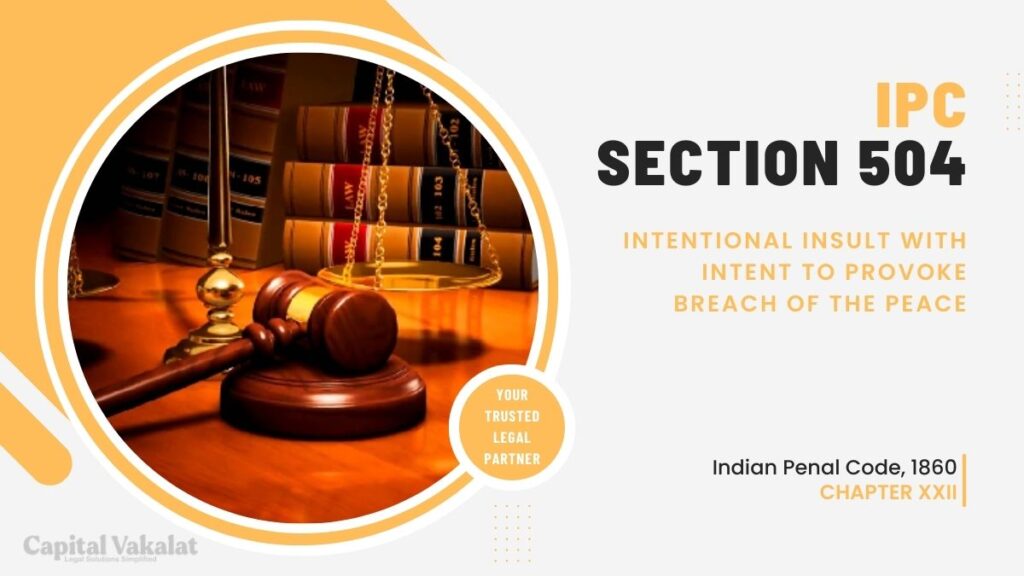Section 504 of the Indian Penal Code (IPC) addresses the issue of intentional insult with the intent to provoke a breach of the peace.

In this article, we will delve into the intricacies of this legal provision, exploring its historical background, legal interpretations, and its significance in maintaining public order.
Understanding Section 504 IPC
Section 504 finds its roots in the Indian Penal Code, a comprehensive legal document that outlines offenses against public tranquility. This section specifically deals with intentional insult and its potential to incite a breach of the peace. To understand this provision, it is essential to grasp the legal elements that constitute intentional insult and the specific intent required to trigger a breach of the peace.
Case Studies
To illustrate the real-world applications of Section 504, we’ll examine notable case studies where individuals faced legal consequences for intentional insults. By exploring these cases, we can gain insights into the legal outcomes and implications of invoking Section 504 in different scenarios.
Significance in Maintaining Public Order
Section 504 plays a crucial role in maintaining public order by curbing acts that could lead to disturbances. This section acts as a legal tool to balance the right to free speech with the need to prevent actions that may jeopardize public safety. We’ll explore the delicate balance required to uphold individual freedoms while safeguarding the collective well-being.
Interpretation of “Intentional Insult”
One of the key aspects of Section 504 is the concept of intentional insult. Legal perspectives vary on what constitutes an intentional insult, and context plays a vital role in these determinations. We’ll examine how the legal system interprets and applies this subjective element.
Analyzing the Intent to Provoke Breach of the Peace
Establishing intent is a crucial component of Section 504 cases. We’ll delve into the nuances of proving intent in legal terms and explore the distinctions between acts that are provocative yet legally protected and those that cross the line into criminal behavior.
Challenges and Criticisms
No legal provision is without controversy, and Section 504 is no exception. We’ll explore the challenges and criticisms surrounding this section, including concerns raised by civil liberties advocates who argue that it may infringe upon freedom of expression.
Landmark Legal Cases
A closer look at landmark legal cases involving Section 504 will provide a comprehensive understanding of how courts have interpreted and applied this provision. By examining these cases, we can identify the precedents set and the legal principles established.
Public Awareness and Education
Ensuring public awareness and education about Section 504 is essential for fostering responsible expression and discourse. We’ll discuss the role of educating the public about the implications of intentional insult and the responsibilities that come with exercising the right to free speech.
Conclusion
In conclusion, Section 504 of the IPC serves as a vital tool in maintaining public order and balancing individual rights. By exploring its historical context, legal interpretations, and real-world applications, we gain a nuanced understanding of the delicate interplay between freedom of expression and societal harmony.
Frequently Asked Questions
What are the potential legal consequences of violating Section 504?
Violating Section 504 can lead to legal penalties, including fines and imprisonment, depending on the severity of the offense and its impact on public order.
How does Section 504 balance free speech with public safety?
Section 504 aims to strike a balance by curbing intentional insults that may lead to a breach of the peace while respecting the right to free speech within lawful boundaries.
Are there any defenses against a Section 504 charge?
Legal defenses may include proving lack of intent, demonstrating that the expression is protected by the right to free speech, or challenging the interpretation of intentional insult in a specific context.
Can Section 504 be misused to suppress dissent or criticism?
Critics argue that Section 504 has the potential for misuse, emphasizing the need for clear legal standards and safeguards to prevent overreach and protect legitimate expressions of dissent or criticism.